Stories > Good Business Sense
Good Business Sense
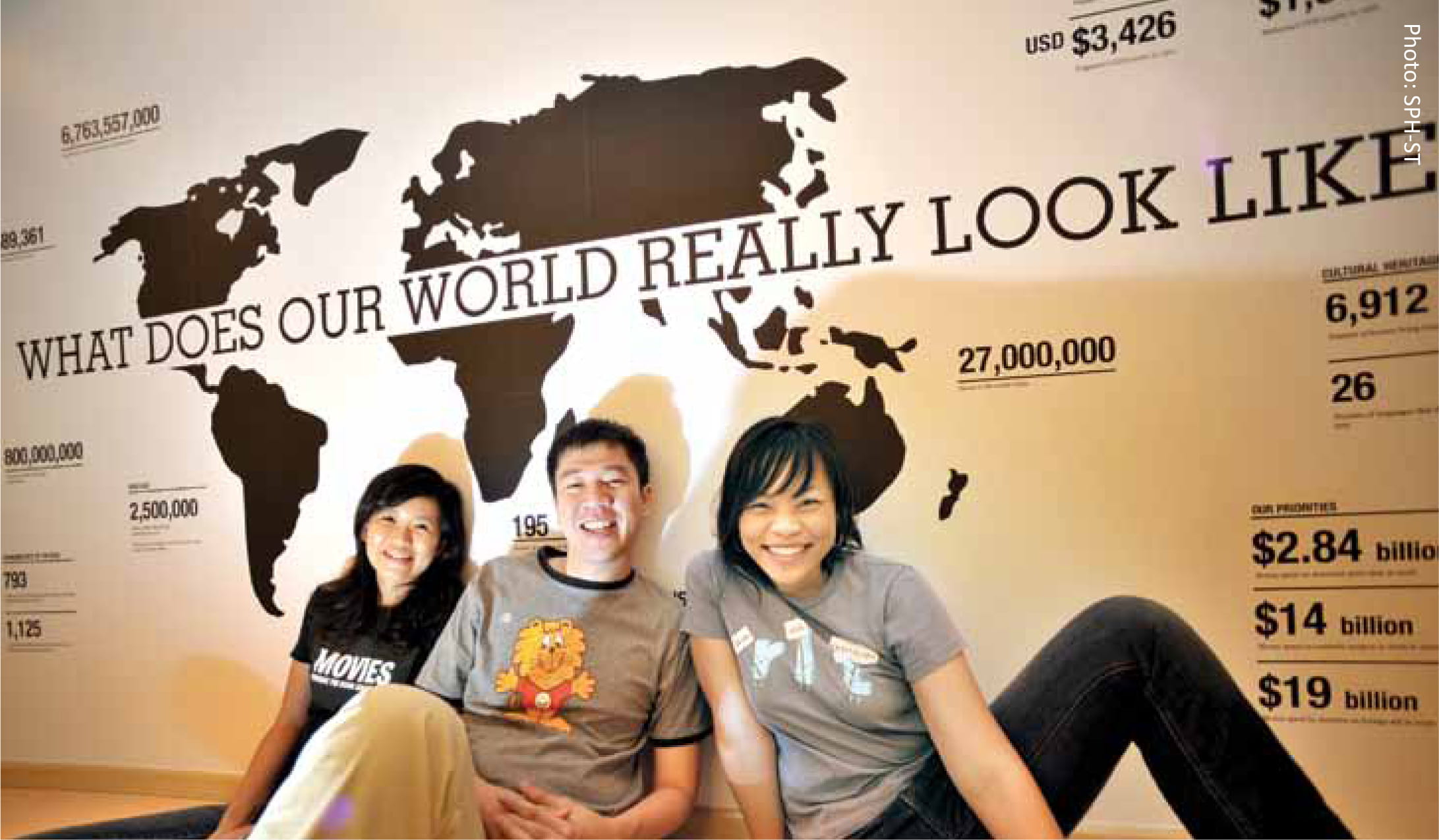
The Thought Collective founders (from left) Elizabeth Kon, Tong Yee and Shiao-yin Kuik champion several causes to make the world a better place. They aim to educate Singaporeans about local and global affairs.

Doing good and running a profitable business can be achieved at the same time through innovative business models. The explosion of these social enterprises in Singapore is creating sustainable impact on the business environment here.
By Swapna Mitter
n 2002, a group of teachers came together to help students who were growing disenchanted with life. Under constant pressure to maintain their grades, the students had little interest in national or global issues. “We felt if they could experience an education that connects (them) with the needs of the world at large, something in them would shift for the better. What bound us together was the belief that education can shape lives and the need to see more people, especially youths,grow in knowledge, empathy and initiative. That is why we started the School of Thought,” says Kuik Shiao-Yin, co-founder and creative director of The Thought Collective (www.thethoughtcollective.com.sg), an early player in the social enterprise scene in Singapore.
Solving Social Ills
A social enterprise differs from a commercial one in that its primary aim is to make a social, and sometimes,environmental impact. While it operates like a commercial venture which is of ten governed by profit, the social enterprise model incorporates a primary social mission.
According to American Bill Drayton, “social entrepreneurs are individuals with innovative solutions to society’s most pressing social problems.” Drayton, a pioneer in social entrepreneurship,founded Ashoka in 1980 to provide start ups a platform to be change-makers. A global association of the world’s leading social entrepreneurs, Ashoka extends financial assistance and professional support services to new businesses and also connect them to a global business network.
At the recent 11th Ideas for a Better World Forum, keynote speaker Pamela Hartigan, recognised as a leader in global social entrepreneurship, spoke on the concept of ‘entreprenuring.’ The forum was organised by Singapore International Foundation, The Hub (a communal,collaborative space for motivated entrepreneurs looking to make a positive impact on society) and *SCAPE (a nonprofit that promotes and supports youth,talent and leadership development).
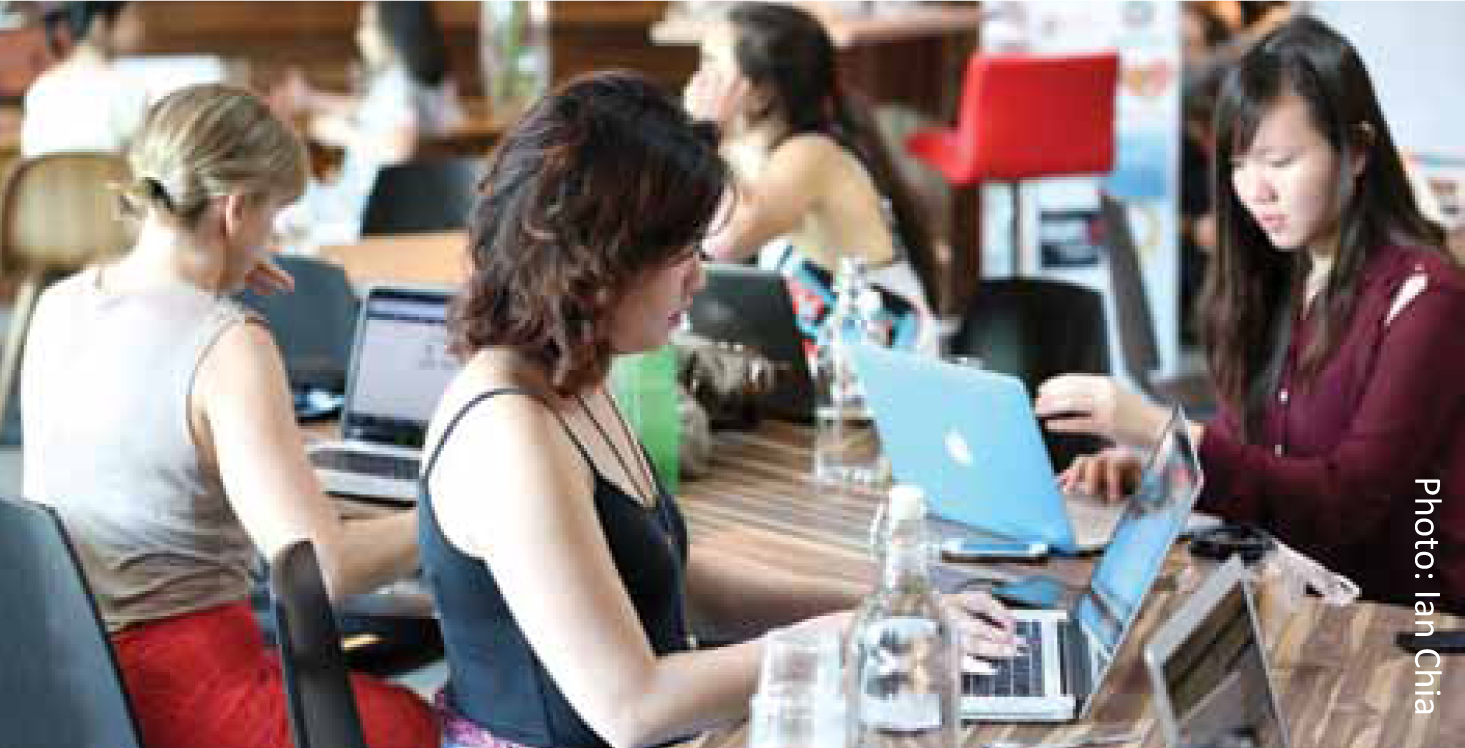
Social entrepreneurs at work at The Hub.
“(Social enterprise) is about using a new lens to look at the world, because old problems need new solutions and new challenges need new thinking.”
- Grace Sai, co-founder, The Hub Singapore.
Hartigan, who is with the Skoll Centre for Social Entrepreneurship at Säid Business School, University of Oxford,pointed out that social entrepreneurship is the business model the world today needs. “The emergence of social entrepreneurship is one response to the frustration felt by those who believe we cannot go on separating where we make our money and where we do the right thing by society and the environment,”she stated. According to Hartigan, the entrepreneurs who started this trend“seized opportunities that others saw as too risky — or non-existent — and through a combination of innovation and resourcefulness, managed to create new or better approaches to critical social and environmental problems.”
Making Impact
The spirit of social entrepreneurship is thriving in Singapore. The Social Enterprise Association was established to nurture social entrepreneurship to effect positive social change. There are about 170 social enterprises in Singapore and this number is on the rise.
According to Grace Sai, co-founder of The Hub Singapore (thehub.sg), “Many have asked me if this social enterprise up rise is a bubble. It is not. It is the future. It will be the dominant approach to how business and society is run. It is about looking at the world with a new lens, because old problems need new solutions and new challenges need new thinking. The government is aware this is the future of economies and societies.
They are pushing hard to grow this movement in Singapore,” says Sai.
“Now that the country is stable economically, people are rethinking the real purpose of jobs and life. We often have CEOs coming to us, curious to know how to blend productivity with passion.”
Sai notices that there has been more interest in social entrepreneurship here.“Previously, the focus was very much on national development, compromising an individual’s passion in the process,” she explains.
With more awareness and better understanding of the world, many are eager to give back. “They are not waiting till they are 60 (years old). They want to leave a legacy at a younger age,” adds Sai. “Much more needs to be done — for example, social entrepreneurship must be taught in schools before the age of15, since that’s when most personalities are formed. There’s a big role for the media, private sectors and NGOs in collaboration with the government and social entrepreneurs.”
Singapore Initiatives
Kuik of The Thought Collective says of the Singapore landscape, “It’s not true that we are not compassionate,creative, innovative or entrepreneurial.These may not be the defining characteristics of our overall culture yet, but there is a groundswell of such greatness happening, especially in the next generation. In my line of work, I have met inspiring and creative entrepreneurs, community workers and civil servants.”
The five companies each represent different yet cohesive strategies. The School of Thought nurtures tomorrow’s thought leaders; Think Tank curates content and designs information fora more meaningful world; Food for Thought serves good food for good causes; Think scape creates experiences that advocate new perspectives on corporations; and Common Ground bridges the public and private sector to facilitate social innovation for pressing national concerns. Food for Thought signed a Memorandum of Understanding with World Vision Singapore in August 2013 to undertake30 child sponsorships in Kirivong, Cambodia. On the Singapore front,they are working with the Singapore Kindness Movement to inspire acts of kindness. From October 2013 onwards,there are charity movie screenings, food distribution projects and a kindness innovation boot camp.
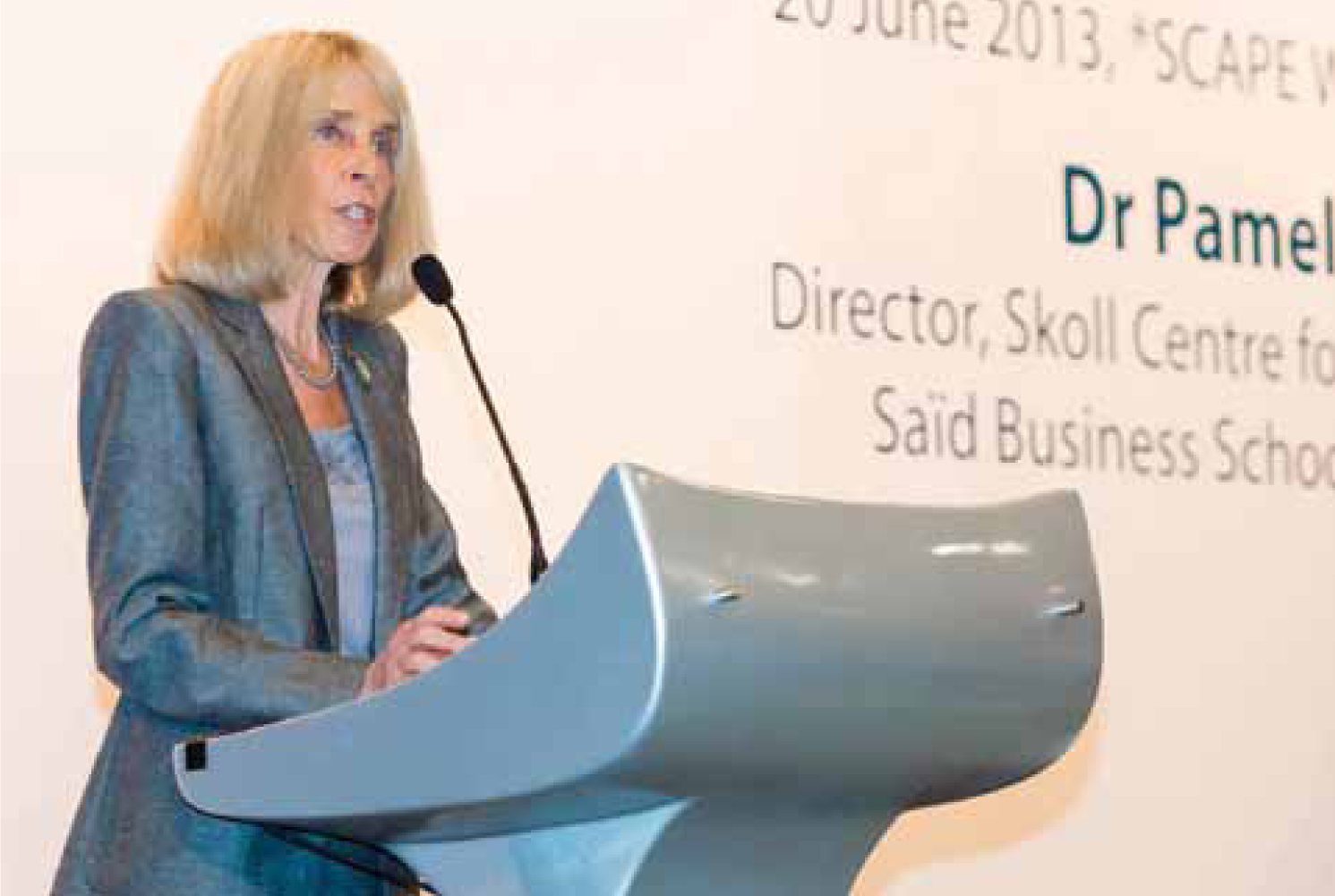
Pamela Hartigan was keynote speaker at SIF’s 11th Ideas for a Better World Forum,themed on Social Enterprise.
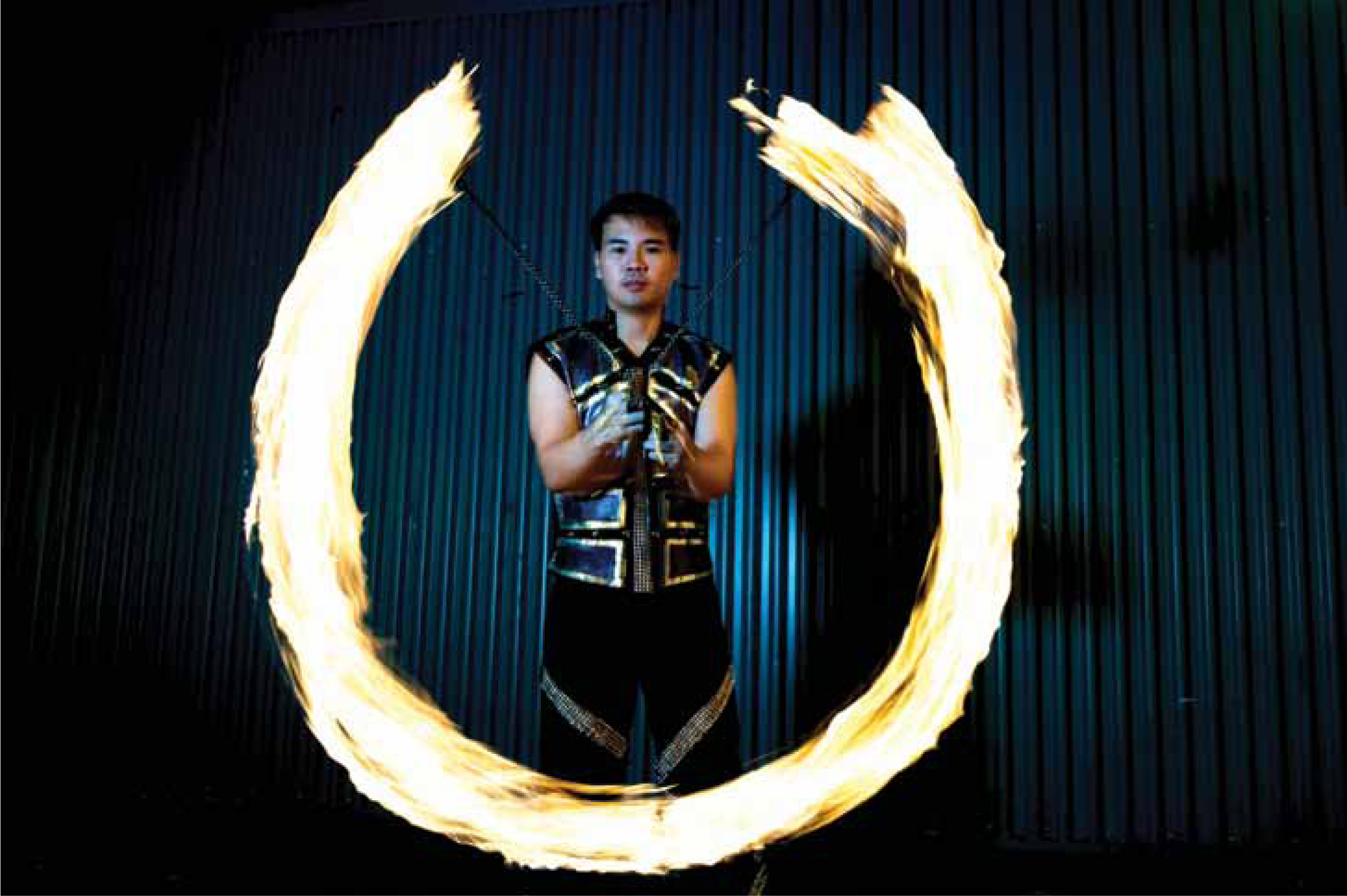
Ernie Tan as the fire twirler in a performance.
Social Circus
Meanwhile, other organisations are also changing lives. Training tripsto Australia in 2001, 2002 and 2008sponsored by Cirque du Monde, the social arm of Cirque du Soleil, were pivotal for social worker Jay Che. He witnessed Cirque du Soleil instructors from Montreal, who work with street kids all over the world, conduct training for aboriginal youths in Broken Hill, Melbourne. “They were taught life-skills to break the cycle of alcohol abuse and domestic violence,” says Che.
Back in Singapore, Che founded Circus in Motion in 2007 — a contemporary social circus arts company to help disadvantaged children and youths.They impart life skills using circus arts through workshops held at schools and performing for corporations. Starting out as a one-man show, Che’s four-man outfit today is supported by six part-timers,who are his company’s beneficiaries.
Che says that the notion of social circus — neither an art nor a sport— could be difficult to sustain as a business model. “We found our niche in some schools that are willing to pay for our services to coach at-risk pupils.Singaporeans find circus arts unique since this is their first exposure,” he adds.
The good is seen in transformed lives like Edward Chua. Eight years ago, Chua was heavily addicted to gaming and would often fall sleep in class. Circus arts displaced Chua’s gaming hobby. He later became a full time instructor, teaching life-skills to kids. Then there’s Ernie Tan.“Tan was a juvenile offender we met 11years ago. Once while performing for a casino in Singapore, he almost landed himself and Circus in Motion in a fix for disciplinary issues. It was a wake-up call and he turned around. Today, he’s our full time instructor and gives 100%,whether it’s workshops or corporate performances,” quips Che with pride.
Fashioned with Love
Another social enterprise that works to uplift the marginalised in society is Aii.Leona Leong started Aii (www.aii.sg) based on the conviction that everyone is equal. She named her company, ‘Aii,’the traditional Chinese and Japanese character for love, making candies packaged as gifts, personalised hampers and corporate goodie-bags.
The 29-year-old Leong started spreading good will at 18 when she noticed ex-convicts and the physically handicapped being side stepped in society. It became her mission to help them.
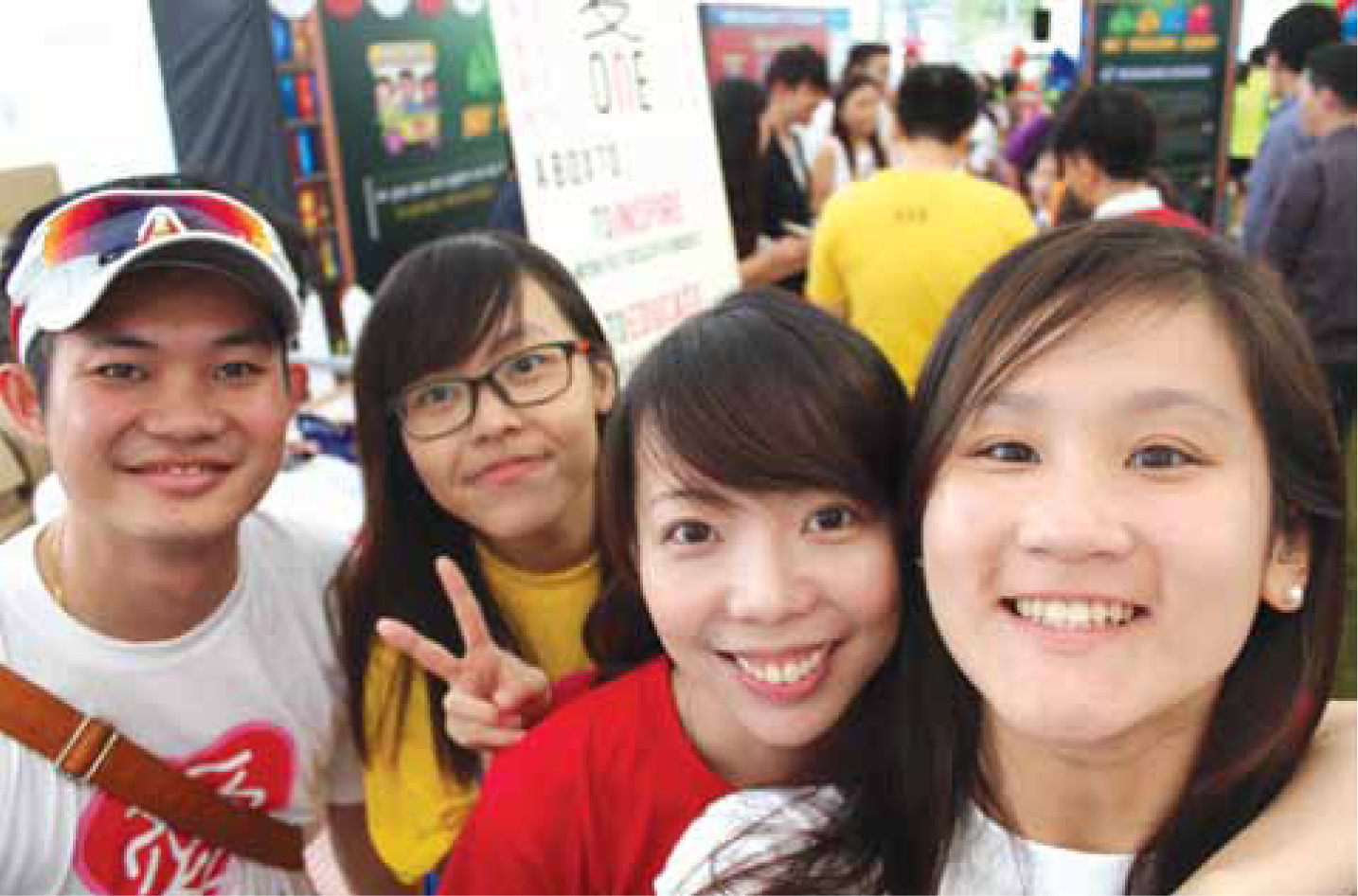
Leong Leong (third from left) with her staff, Jacky Ng, Lu Chanying and Ivy Lu.
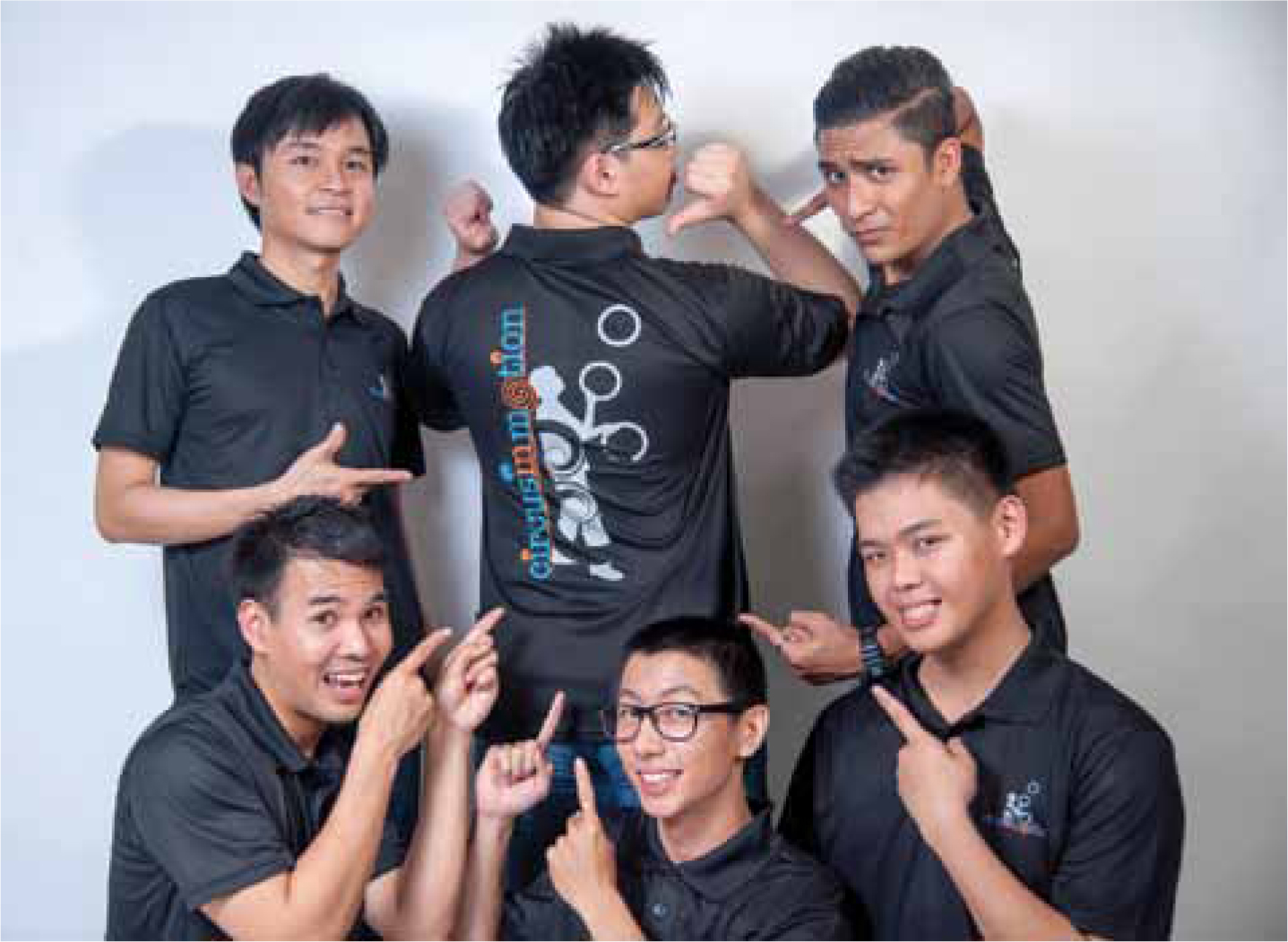
Team Circus in Motion, standing from left, Principal Instructor Jay Che with his team,Edward Chua and Firdaus; front row from left,, Ernie Tan, Gabriel Leong and Benjamin Teo.
Leong’s initial investment was a meagre $2,000. It wasn’t all smooth sailing in the beginning as she did not get like-minded people to join her initially. Two hearing-impaired girls she hired as interns are today part of Aii’s management. “I wanted to create a‘home’ for them,” explains Leong and adds, “I’m a dreamer and I like to achieve many things. And I want to give people like my girls the courage to dream. By dreaming, everyone can progress.”
A Clear Mission
Is the balancing act of doing good while turning a healthy profit too daunting to sustain? Che of Circus in Motion says that finding the equilibrium between profit and social responsibility is not tough once you are clear about your mission and vision. “You just have to review the reasons for setting up the company before taking any decisions and you will have your answers.” He says that his team always remind one other why they are doing this and they should improve.
According to Kuik of The Thought Collective, “All businesses can, should and must operate profitably. Our notion of a profitable business should not just be weighed on how much money is made, but also how much good it manages to create.” She believes every company should consider how it can contribute to society through its goods and services, the jobs they create and how employees, suppliers and customers are treated. “We did not follow any established model. We created and recreated it on the basis of what works, what generates results,what makes sense for us and what is true to our personal values.”

Aii employs the hearing-impaired to produce customised Aii candy as corporate gifts.
Impacting Society
For those in this sector, the future holds much promise. Grace Sai, for one,is enthusiastic. “We need to attract more talented and passionate people to do the work we want to do. We are launching a Hub Academy, an incubator for double and triple bottom line entrepreneurs.” The double bottom line she’s referring to is profit and making a positive social impact. Companies which make environmental impact are called triple bottom line enterprises. It’s not hard to stay relevant and spread the message, she believes.
“The waves have been created, I am merely surfing them and creating more ripples on our shores,” states Sai. A new initiative is introducing ‘intrapreneurs’,a management style that merges risk-taking, innovation, reward and motivational approaches, by individuals within an organisation.
Hartigan could have been thinking about such enthusiastic, passionate and visionary entrepreneurs when she said at the Ideas for a Better World Forum,“Humanity is interdependent, and while our natural resources are finite, our inner resources and creativity are limitless. We need to work together to continue to evolve ourselves, our leadership and our culture so that we can all live up to the promise that entrepreneurship holds for our future and the future of our planet.”

The Singapore International Foundation’s Young Social Entrepreneurs programme nurtures fledgling innovators through a transformative journey that turns out business savvy change makers.
eeing young students hanging around aimlessly after school sparked something in friends Tengku Ahmad Syamil Tengku Ibrahim and Muhammad Syakir Hashim.They decided to do something concrete.
Today, the two Singaporeans are running Urbane Academy, which offers after-school care programmes for boys aged 11 to 14 years old. The two young men comprise one of the 16 teams shortlisted at the Singapore International Foundation’s Young Social Entrepreneurs (YSE) workshop held from 14 to 16 March 2013 in Singapore.
Gathering Nations
The programme started out as a five day in-residency workshop in 2010 with 25 participants. In four years, it has grown to include 191 alumni of 12 nationalities. Besides a three-day workshop, mentorship sessions, study visits to social enterprises overseas and a pitching session, alumni events are held throughout the year. programme’s tagline, ‘Inspiring and Enabling Action for a Better World’ is a good indication of the nature of the participants it attracts — practical young idealists who dream big. A total of 37 business proposals were accepted for YSE 2013 workshop, from individuals or teams of up to three people, totalling 76 participants of 10 nationalities.
Thought Leaders
At the YSE workshop, they learn about social business from experts and their peers, through business clinics, presentations and the SIF’s Ideas for a Better World forum which has featured thought leaders including social entrepreneur Dr Mechai Viravaidya, Chairman of Population and Development International.
Said participant Gloria Shi from China, the individual behind Social Enterprise for Economic Development — a social enterprise seeking to teach computer skills to the underprivileged, “I used to think that it is impossible for us to change the system… but after learning about the story of Dr Mechai and his Cabbages and Condoms social enterprise (during the study visit to Thailand), I was exposed to a new way of thinking.”
Unlike some start-up competitions, the SIF’s YSE 2013 programme, which kicked off on 14 March, isn’t a mere dash for cash but a rigorous eight-month journey in which participants aged below 26 years have their ideas tested, reformulated and tested again. They are mentored by advisors led by global management consulting firm McKinsey and Company, participate in an overseas study visit to leading social enterprises in Thailand and sharpen their business skills through business clinics.
Networking
In the pitching session for funding on 12 Oct, sponsored by venture philanthropy organisation, Asia Philanthropic Ventures, the shortlisted teams are grilled by industry experts on the viability of their business models.Whether they win or not, every team would have emerged with a workable business model in their hands.Participants past and present also get to leverage on a valuable network. The YSE Business Insights series brings the YSE alumni network together to share insights and build contacts for effecting positive change. Partners for the series have included Google.

YSE Business Insights Session 2 supported by Google.
Solving Issues
Another team in YSE 2013 is Social Cops, based in New Delhi. Said team member Prukalpa Sankar, “My biggest takeway was from the peer group of YSE, who are so driven to make change in their communities. We believe that these relationships formed will play a major role in expanding our company beyond India.”
Applications for YSE 2014 are open now. Visit the YSE programme page at www.sif.org.sg/yse for more information and to register.
